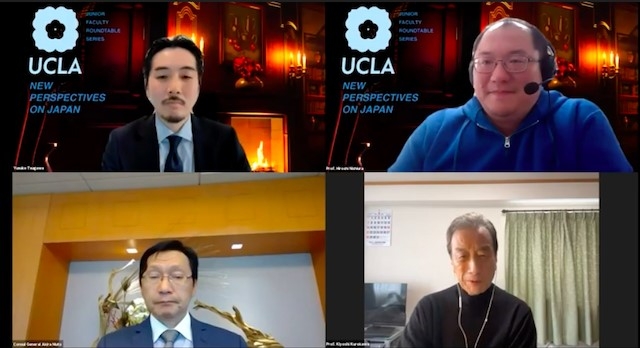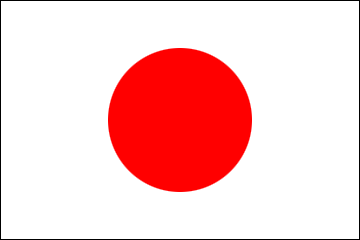Webinar on "New Perspectives on Japan: How Japan Responded to the COVID-19 Pandemic"
2021/4/27
On March 29, 2021, the UCLA Terasaki Center for Japanese Studies presented a webinar entitled, “New Perspectives on Japan: How Japan Responded to the COVID-19 Pandemic,” as part of its Junior Faculty Roundtable Series.
The speakers -- Dr. Kiyoshi Kurokawa (Chairman, Health and Global Policy Institute); Consul General of Japan in Los Angeles Akira Muto; Dr. Hiroshi Nishiura (Professor of Hygiene, Kyoto University School of Public Health) explained approaches adopted by Japan to tackle COVID-19, the pandemic’s impact, and what the world can potentially learn from Japan’s experience. Dr. Yusuke Tsugawa, UCLA Assistant Professor of Medicine, moderated the webinar.
Dr. Nishiura talked about how Japan launched a cluster-buster team in February 2020 as part of the emergency response team to analyze the first 100-plus cases in Japan. Among the findings was that primary cases did not lead to as many secondary cases, and that primary cases that became super spreaders were mainly in closed contact spaces. Therefore, Japan worked on a suppression strategy for COVID-19, focusing on high-risk settings such as indoor live performances, drinking establishments and karaoke venues. Rather than implementing a strict lockdown, Japan asked the general public to voluntarily reduce contact on their own and conducted a focused intervention on high-risk settings.
Consul General Muto explained Japan’s approach of minimizing transmission while maintaining economic activities. In particular, Japan sought to identify common sources of outbreaks through retrospective contract tracing (where past activities of multiple infected people are investigated to identify common sources of infection) compared to prospective contract tracing in the US and Europe, which entails the monitoring of infected individuals, their close contacts and searches for future infection cases. He also discussed Japan’s efforts to play an international leadership role in pandemic countermeasures. Japan has provided $1.54 billion in medical assistance and grants to over 90 developing countries. Also, Japan is extending emergency loans of up to $4.5 billion to Asian countries in the next two years to support their economic recovery from the pandemic crisis, and $240 million to the COVAX advance market commitment, so that small and medium-income countries get equitable access to the vaccines. He added that there will be no safe place in the world until all regions and countries overcome COVID-19.
Dr. Kurokawa noted a wide variation in COVID-19 deaths among countries such as the United Kingdom and the U.S., where COVID was a leading cause of deaths last year, while figures in Japan and other parts of Asia were low. He explained that in an interconnected world marked by traffic among people, countries can learn from each other, for instance how different heads of state responded to the COVID-19 outbreak. In addition to following and learning what other countries are doing, he urged an examination of the causes and differences in responses to COVID-19.

The speakers -- Dr. Kiyoshi Kurokawa (Chairman, Health and Global Policy Institute); Consul General of Japan in Los Angeles Akira Muto; Dr. Hiroshi Nishiura (Professor of Hygiene, Kyoto University School of Public Health) explained approaches adopted by Japan to tackle COVID-19, the pandemic’s impact, and what the world can potentially learn from Japan’s experience. Dr. Yusuke Tsugawa, UCLA Assistant Professor of Medicine, moderated the webinar.
Dr. Nishiura talked about how Japan launched a cluster-buster team in February 2020 as part of the emergency response team to analyze the first 100-plus cases in Japan. Among the findings was that primary cases did not lead to as many secondary cases, and that primary cases that became super spreaders were mainly in closed contact spaces. Therefore, Japan worked on a suppression strategy for COVID-19, focusing on high-risk settings such as indoor live performances, drinking establishments and karaoke venues. Rather than implementing a strict lockdown, Japan asked the general public to voluntarily reduce contact on their own and conducted a focused intervention on high-risk settings.
Consul General Muto explained Japan’s approach of minimizing transmission while maintaining economic activities. In particular, Japan sought to identify common sources of outbreaks through retrospective contract tracing (where past activities of multiple infected people are investigated to identify common sources of infection) compared to prospective contract tracing in the US and Europe, which entails the monitoring of infected individuals, their close contacts and searches for future infection cases. He also discussed Japan’s efforts to play an international leadership role in pandemic countermeasures. Japan has provided $1.54 billion in medical assistance and grants to over 90 developing countries. Also, Japan is extending emergency loans of up to $4.5 billion to Asian countries in the next two years to support their economic recovery from the pandemic crisis, and $240 million to the COVAX advance market commitment, so that small and medium-income countries get equitable access to the vaccines. He added that there will be no safe place in the world until all regions and countries overcome COVID-19.
Dr. Kurokawa noted a wide variation in COVID-19 deaths among countries such as the United Kingdom and the U.S., where COVID was a leading cause of deaths last year, while figures in Japan and other parts of Asia were low. He explained that in an interconnected world marked by traffic among people, countries can learn from each other, for instance how different heads of state responded to the COVID-19 outbreak. In addition to following and learning what other countries are doing, he urged an examination of the causes and differences in responses to COVID-19.

